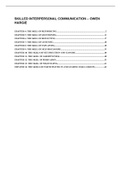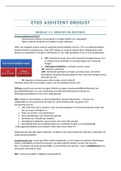Samenvatting
Samenvatting Skilled Interpersonal Communication, ISBN: 9781032008783 Interpersoonlijke Communicatie (IPC)
- Instelling
- Vrije Universiteit Amsterdam (VU)
Samenvatting Hargie Skilled Interpersonal Communication (hoofdstuk 4-14) Vak: Interpersoonlijke Communicatie (1e jaars Communicatiewetenschap VU)
[Meer zien]






